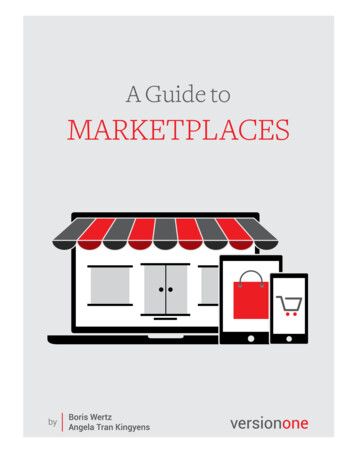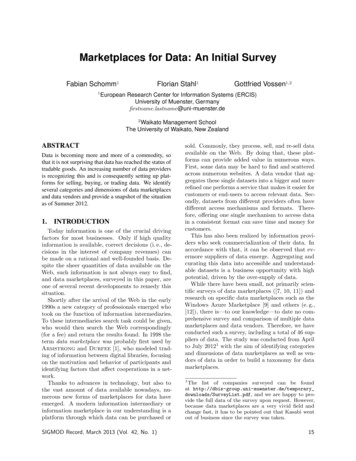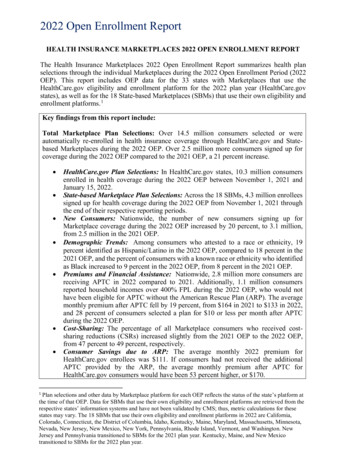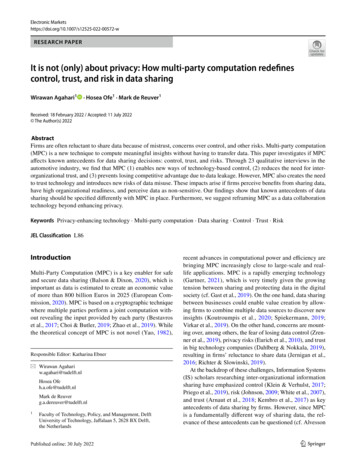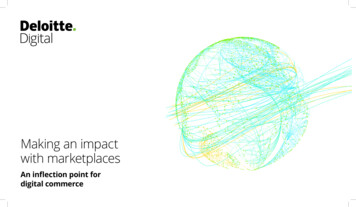
Transcription
Making an impactwith marketplacesAn inflection point fordigital commerce
Making an impact withmarketplacesAn inflection point for digital commerceAs companies across industries look to replicate thesuccess of online commerce leaders such as Amazonand Alibaba, the topic of digital marketplaces hasbecome a hot one.What exactly are digital marketplaces, and how canthey help you generate new value for the business?For many enterprise leaders leveraging SAP solutionsfor commerce, answering that question becomesimperative. Start with a high-level view of the landscapeand the potential opportunities.What is a marketplace?01Two dimensions: catalog breadth, retail reach02Making the shift toward a marketplace03Adopting a marketplace platform04Taking the next step05Let’s talk
What is a marketplace?0102A marketplace is a digital platform on which an operator hosts andfacilitates the sale of products and services between its customers andmultiple third-party sellers.03OperatorThere are three actors within a marketplace environment:The operator provides the sales platform, manages the salesexperience, collects order details, and processes the financialtransaction. When it comes to compensation, the operatorreceives a commission on the gross merchandise volume sold viaits marketplaces. Commissions generally range from 5% to 25%,depending on the type of marketplace and sales volume.The sellers are responsible for sourcing or producing the inventory,holding it in warehouses and fulfilling the orders received. Sellersmust also respond to customer inquiries and process returns.The customers are the purchasers—the endpoints in the digitalcommerce thread.SellersHosts transactions andmanages sellers04Marketplace05Hold inventoryand fulfill ordersCustomersBuy frommarketplace
Two dimensions:catalog breadth, retail reachGenerally, two qualities define a marketplace.The first is the breadth of the catalog. Broadmarketplaces are "everything" stores, sellingproducts and services across an almostunlimited set of categories. These marketplacesare the digital evolution of multibranddepartment stores and deliver consumer valuewith convenience. But new entrants can havea difficult time achieving the scale requiredto populate so many categories—and to wincustomers from entrenched competitors. Manynew marketplace operators, therefore, focuson niche marketplaces, which serve singleindustries or specific categories. Examplesinclude Reverb, for musical instruments, andHouzz, for home furnishings.The second characteristic is whetherthe operator is also a retailer itself. Puremarketplaces are those that sell only third‑partygoods (eBay is one example). In hybridmarketplaces, retailers offer their own goodsand services alongside those of outside sellers(Amazon is a prime example). In some hybridmarketplaces, operators compete directly withtheir marketplace sellers on the same goods.In other cases, the sellers are restricted tocategories or products in which the operatordoes not offer its own azonHybridOverstockBest BuyNeweggUrbanOutfittersSeatGeek030405
Making the shift towarda marketplaceYou likely have already interacted withmarketplaces—perhaps without even realizing it.There are a few well-known, pure marketplacessuch as eBay in the United States and Taobao inChina. In those marketplaces, buyers generallyrecognize that they are interacting with third‑partysellers. But a growing number of traditionalretailers are introducing marketplace platforms totheir existing online sales channels. (Do you knowwho fulfilled your last Amazon or Best Buy order?)Many well-known consumer brands have recentlylaunched marketplaces with third-party sellers tosupplement their core online product offerings.In fact, Gartner predicts that by 2020, "more than50% of online sellers will either list their productson marketplaces or sell third-party products ontheir core commerce sites." 11. Gartner. Magic Quadrant for Digital Commerce. June 2018Increasingly, companies view marketplaces asa way to offer customers a larger and richerselection of products, without the need toincrease on-hand inventory or logistics support.Companies can realize increased revenuethrough commissions on sales and still collectvaluable customer and transactional data onall sales. They can then use this data to bettertarget marketing efforts, based on purchasehistory, and they can identify opportunities forfuture core product expansion, based on provensales. For example, Amazon uses sales trendsfrom its marketplace to identify products to addto its own warehouse inventory, and where toexpand its AmazonBasics white-label products.22. -make-one-too0102030405
Adopting a marketplaceplatformMarketplace operation applications can helpsupport companies’ marketplace ambitions.When looking at potential offerings, it’s importantto consider the full lifecycle of marketplaceoperations—from onboarding sellers toimporting products to facilitating orders tosupporting post-purchase activities. A strongmarketplace solution provides a technologyplatform, integrating business leading practicesto support all phases of the operations lifecycle.For companies using or considering SAPtechnologies, one new marketplace platformhas entered the mix—the SAP CommerceMarketplace Management by Mirakl, whichcan extend the traditional SAP Commercedigital storefront with marketplace capabilities.Mirakl is a SaaS-based backend platform thatoffers seller onboarding and performancetracking, a product catalog curator, pricing andpromotion management, order orchestration,commission calculation, and other features.It also can help facilitate customer servicebetween customers and sellers.Organizations can incorporate SAP CommerceMarketplace Management by Mirakl into new orexisting commerce storefronts, with the solutionintegrating into front-end storefronts to displaymarketplace information—such as seller detailsand reviews. SAP Commerce is still responsiblefor collecting customer information, capturingpayment, and facilitating order processing0102030405
Taking the next stepAs the face of digital commerce changes,many organizations will realize that, to remaincompetitive, they will have to integratemarketplaces into their enterprise ITlandscapes. They also will have to adapt theirdigital commerce models to incorporate anentirely new array of products, processes,and third-party sellers. By developing a clearvision and a clear strategy, businesses canunlock a number of important benefits.For example, you can:Enhance the customer experience anddrive customer loyaltyDevelop processes to help acceleratethe identification and onboarding ofthird‑party sellersEstablish quality standards for productdescriptions, metadata, and imagesSource and curate products based oncustomer behaviorIncrease revenue through expandeddigital commerce capabilitiesDevelop customer service proceduresfor marketplace orders—to align withcustomer expectationsOperate more efficiently with acommerce platform integrated tightlywith core business systemsDerive insights to drive decision-making—for example, through monitoring sellerperformance and KPI adherence01Making the move to a marketplace requires morethan an ability to plug in technology. You likely willneed help selecting technologies and integratingthem with other solutions, such as the SAPS/4HANA digital core ERP, SAP Analytics Cloud,and other SAP Customer Experience solutions,including SAP C/4HANA. You also may needassistance with identifying and prioritizing areasfor growth, aligning your business processes withnew IT, managing risks, and driving change withinyour organization.02030405
Let’s talkNo matter where you are in the commercetransformation journey, Deloitte can bringextensive capabilities and experience atthe intersection of business transformationand SAP technology enablement—includingsystems design, project planning, technologyintegration, and change management.Wondering what your next step should befor digital commerce? A conversation withDeloitte can be an excellent starting point.Deloitte can help you reimagine everything anddevelop a new vision for digital commerce. Wecan also help you bring that vision to life—soyou can start realizing benefits sooner.Contact us for additional insights, to schedulea demo of SAP Commerce MarketplaceManagement by Mirakl, or to discuss a specificchallenge your organization is facing.01Gagan MehraMirakl Alliance LeadDeloitte Consulting LLPgaganmehra@deloitte.comKashif RahamatullahPrincipal, US and Global SAP CustomerExperience Lead, Deloitte Consulting LLPkrahamatullah@deloitte.com@DCKashifPaul do FornoManaging DirectorDeloitte Consulting LLPpdoforno@deloitte.com@dofornopBrady Emerson02ManagerDeloitte Consulting LLPbemerson@deloitte.com03Surya Saurabh04Senior ManagerDeloitte Consulting LLPsursaurabh@deloitte.com@suryasaurabhBill ZehmerManaging DirectorDeloitte Consulting .deloitte.com/SAP@DeloitteSAP05
About DeloitteDeloitte refers to one or more of Deloitte Touche Tohmatsu Limited, a UK private company limited byguarantee (“DTTL”), its network of member firms, and their related entities. DTTL and each of its memberfirms are legally separate and independent entities. DTTL (also referred to as “Deloitte Global”) does notprovide services to clients. Please see www.deloitte.com/about for a more detailed description of DTTL andits member firms.Deloitte provides audit & assurance, consulting, financial advisory, risk advisory, tax and related servicesto public and private clients spanning multiple industries. Deloitte serves four out of five Fortune Global500 companies through a globally connected network of member firms in more than 150 countries andterritories bringing world-class capabilities, insights, and high-quality service to address clients’ mostcomplex business challenges. To learn more about how Deloitte’s approximately 286,000 professionalsmake an impact that matters, please connect with us on Facebook, LinkedIn, or Twitter.This communication contains general information only, and none of Deloitte Touche Tohmatsu Limited,its member firms, or their related entities (collectively, the “Deloitte network”) is, by means of thiscommunication, rendering professional advice or services. Before making any decision or taking any actionthat may affect your finances or your business, you should consult a qualified professional adviser. No entityin the Deloitte network shall be responsible for any loss whatsoever sustained by any person who relies onthis communication.Copyright 2019 Deloitte Development LLC. All rights reserved.
marketplaces—perhaps without even realizing it. There are a few well-known, pure marketplaces such as eBay in the United States and Taobao in China. In those marketplaces, buyers generally recognize that they are interacting with third -party sellers. But a growing number of traditional retailers are introducing marketplace platforms to

